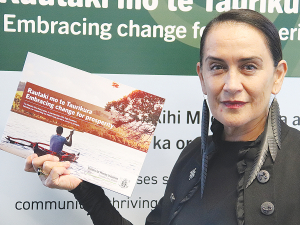Maori ag sector 'one to watch'
The Māori agriculture sector is experiencing major growth and the Director General of Ministry for Primary Industries Ray Smith says it's an area to watch with its value trebling in the past decade.
 Traci Houpapa says the new strategy is a major step in the way that MPI will align its services, resources and funding to Māori.
Traci Houpapa says the new strategy is a major step in the way that MPI will align its services, resources and funding to Māori.
A strategy designed to increase the prosperity of Māori agribusiness was recently unveiled at Fieldays.
Ruataki mo te Taurikura, Embracing Change for Prosperity, has been developed over the past 18 months by Nga Pouwhiro Taimatua, the Māori Primary Sector Forum. This was set up to provide strategic advice to, MPI (Ministry for Primary Industries) on how best grow the Māori primary sector economy.
The advisory group is chaired by well-known Māori agri-business leader Traci Houpapa and comprises a number of Māori leaders in the sector, including the chief executive of Horticulture NZ, Nadine Tunley. MPI director general Ray Smith says the 26 page document is designed to support Māori, whom he says are a driving force behind the food and fibre sector and are vital partners for a prosperous future.
The report notes that the Māori agriculture forestry and fishing asset base was worth $23 billion in 2018 and that 22,500 Māori are employed in these sectors. The report says the challenge and the purpose of the report is to unlock the potential productivity of the Māori asset base.
Smith says Māori agribusiness is a big thing in MPI and already there are some big platforms in place to support Māori. He says Ruataki mo te Taurikura is about doing much more for Māori agribusiness. The report singles out three areas which will be the focus for the coming 18 months.
These involve partnering with other Māori and government agencies to provide more integrated services and informed policies that reflect the challenges and opportunities for Māori: investing in new products, services and supply chains that Māori can capitalise on and MPI providing services to meet the aspirations of Māori.
“We have a range of people on the ground now and we will be putting more on the ground in the coming year.”
Smith says as the director-general of MPI he has a duty to protect Māori interests in the food and fibre sector and have a dedicated plan to protect their interests.
Houpapa, who chaired the group which produced the document, says the new strategy is exciting and a major step in the way that MPI will align its services, resources and funding to Māori. She says the way that government agencies target service delivery to Māori is very convoluted, challenging and complex.
“Sometimes Māori have said this is too hard and we will do it without you. But now MPI have stood up and said while we have done some great things – we want to do better,” she says.
Houpapa says Māori are significant producers of food and fibre and are smart, innovative people. She says as a result of the report, she expects to see a greater awareness within MPI about the needs of Māori.
Houpapa says it provides opportunities for MPI staff to get out into the regions and catch up with Māori to better understand their needs and get the resourcing they need. She says the result will be better and more appropriate policy.
Associate Minister of Agriculture Meka Whaitiri who championed the development of the strategy says it is all about acknowledging the amazing Māori agribusinesses that already exist and giving them the opportunity to share their Māori experiences.
She says Māori are unique in that they cannot sell their land and have to make do with what they have. She adds that in many instances the land they have is not as good as that which was confiscated by the Crown.
Following a side-by-side rolling into a gully, Safer Farms has issued a new Safety Alert.
Coming in at a year-end total at 3088 units, a rise of around 10% over the 2806 total for 2024, the signs are that the New Zealand farm machinery industry is turning the corner after a difficult couple of years.
New Zealand's animal health industry has a new tool addressing a long-standing sustainability issue.
The Government has announced that ACC will be a sponsor of this year's FMG Young Farmer of the Year competition.
As veterinary student numbers grow to help address New Zealand's national workforce shortge, Massey University's School of Veterinary Science is inviting more veterinary practices to partner in training the next generation of vets.
South Island dairy farmers will soon be able to supply organic milk to Fonterra.

OPINION: Meanwhile, red blooded Northland politician Matua Shane Jones has provided one of the most telling quotes of the year…
OPINION: This old mutt has been around for a few years now and it seems these ‘once in 100-year’ weather…